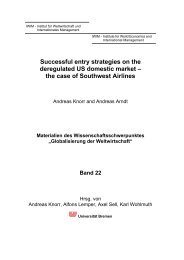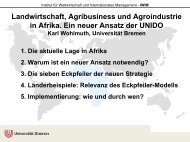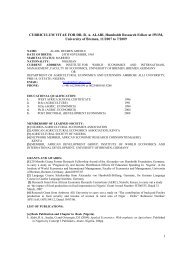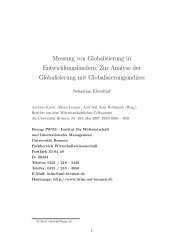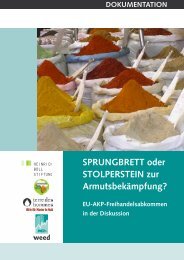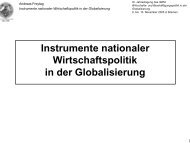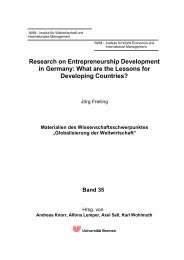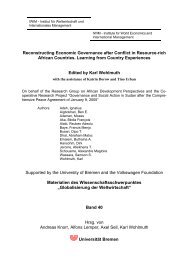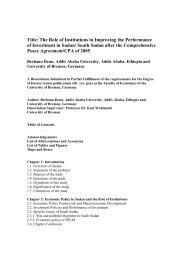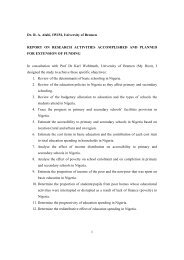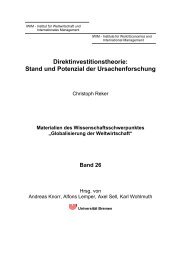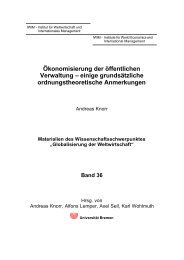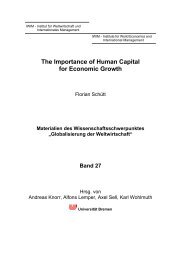Sectoral Analysis of Impact of Foreign Aid in Nigeria - Institute for ...
Sectoral Analysis of Impact of Foreign Aid in Nigeria - Institute for ...
Sectoral Analysis of Impact of Foreign Aid in Nigeria - Institute for ...
You also want an ePaper? Increase the reach of your titles
YUMPU automatically turns print PDFs into web optimized ePapers that Google loves.
9<br />
Not all research has shown that a positive relationship to exist between aid and<br />
growth. Even be<strong>for</strong>e Burnside and Dollar’s monumental f<strong>in</strong>d<strong>in</strong>gs, a study by Boone (1995)<br />
found that aid-<strong>in</strong>tensive African countries experienced zero per capita economic growth <strong>in</strong><br />
the 1970s and 80s, despite <strong>for</strong>eign aid actually <strong>in</strong>creas<strong>in</strong>g (as measured by share <strong>of</strong> GDP) 10 .<br />
Additionally, Knack (2001) found that high levels <strong>of</strong> <strong>for</strong>eign aid can erode bureaucratic and<br />
<strong>in</strong>stitutional quality, trigger<strong>in</strong>g corruption, and encourag<strong>in</strong>g rent-seek<strong>in</strong>g behavior. The most<br />
ardent critics <strong>of</strong> aid programs, especially Bauer (1971) and Friedman (1958), attack <strong>for</strong>eign<br />
assistance on the grounds that politicians will not allocate aid efficiently when measured<br />
aga<strong>in</strong>st the goals <strong>of</strong> aid programs. They argue that recipient countries will consume capital<br />
<strong>in</strong>flows s<strong>in</strong>ce lack <strong>of</strong> domestic sav<strong>in</strong>gs reflects lack <strong>of</strong> opportunities. There is also evidence<br />
that the effects <strong>of</strong> <strong>for</strong>eign aid can be mitigated by other non-economic factors. Situations <strong>of</strong><br />
state failure, such as ethnic conflict, genocide, and revolution can all potentially <strong>in</strong>fluence the<br />
extent to which aid impacts growth.<br />
Accord<strong>in</strong>g to Djankov, et al (2005), <strong>for</strong>eign aid provides a w<strong>in</strong>dfall <strong>of</strong> resources to<br />
recipient countries and may result <strong>in</strong> the same rent seek<strong>in</strong>g behavior as documented <strong>in</strong> the<br />
“curse <strong>of</strong> natural resources” literature. In their paper, they discussed this effect and document<br />
its magnitude. Us<strong>in</strong>g data <strong>for</strong> 108 recipient countries <strong>in</strong> the period 1960 to 1999, they found<br />
that <strong>for</strong>eign aid has a negative impact on democracy. For comparison, they also measure the<br />
effect <strong>of</strong> oil rents on political <strong>in</strong>stitutions. They concluded that <strong>for</strong>eign aid is a bigger curse<br />
than oil.<br />
The need <strong>for</strong> specific country case study is imperative because many <strong>of</strong> the literature<br />
on the <strong>for</strong>eign aid and its impact on development <strong>in</strong> the recipient countries focus on the<br />
relationship between aid and economic growth and uses <strong>in</strong>ternational cross section statistical<br />
<strong>in</strong>vestigations rather than <strong>in</strong>dividual country case study (Riddell, 1987; Mosley et al, 1987).<br />
The results <strong>of</strong> the cross-section studies usually depend on the countries and periods <strong>of</strong> study<br />
chosen. Such studies face numerous problems <strong>of</strong> measurement and <strong>in</strong>terpretation and <strong>of</strong>ten<br />
ignore the stylized structural features <strong>of</strong> <strong>in</strong>dividual countries. For example, <strong>for</strong>eign aid was<br />
once associated with reduced domestic sav<strong>in</strong>gs, but comprehensive surveys on <strong>in</strong>dividual<br />
recipient countries have proved otherwise. <strong>Foreign</strong> aid can <strong>in</strong>fluence, either positively or<br />
negatively, the expenditure patterns and economic development <strong>of</strong> the recipient countries.<br />
10 Boone (1995) concluded that aid does not significantly <strong>in</strong>crease <strong>in</strong>vestment and growth, nor benefit the poor<br />
but it does <strong>in</strong>crease the size <strong>of</strong> government. He also found that the impact <strong>of</strong> aid does not vary accord<strong>in</strong>g to<br />
whether recipient governments are liberal democratic or highly repressive.



